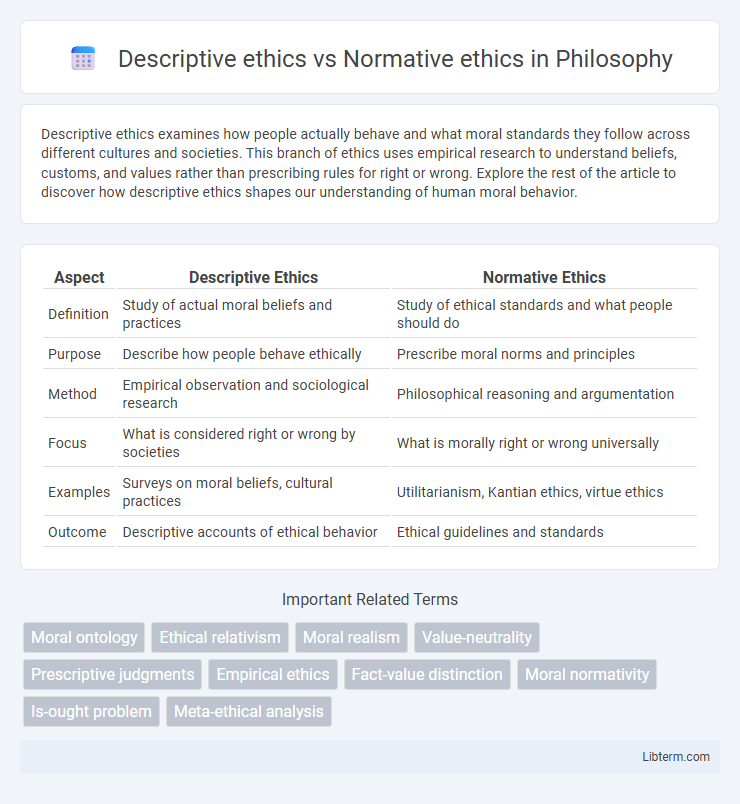Descriptive ethics examines how people actually behave and what moral standards they follow across different cultures and societies. This branch of ethics uses empirical research to understand beliefs, customs, and values rather than prescribing rules for right or wrong. Explore the rest of the article to discover how descriptive ethics shapes our understanding of human moral behavior.
Table of Comparison
| Aspect | Descriptive Ethics | Normative Ethics |
|---|---|---|
| Definition | Study of actual moral beliefs and practices | Study of ethical standards and what people should do |
| Purpose | Describe how people behave ethically | Prescribe moral norms and principles |
| Method | Empirical observation and sociological research | Philosophical reasoning and argumentation |
| Focus | What is considered right or wrong by societies | What is morally right or wrong universally |
| Examples | Surveys on moral beliefs, cultural practices | Utilitarianism, Kantian ethics, virtue ethics |
| Outcome | Descriptive accounts of ethical behavior | Ethical guidelines and standards |
Introduction to Descriptive and Normative Ethics
Descriptive ethics examines how people actually behave and what moral beliefs they hold across different cultures and societies, relying on empirical observation and social science research. Normative ethics, in contrast, explores philosophical theories about what actions are morally right or wrong, establishing standards and principles to guide ethical behavior. Understanding the distinction between descriptive and normative ethics is crucial for analyzing moral systems and addressing ethical dilemmas effectively.
Defining Descriptive Ethics
Descriptive ethics involves the empirical study of people's moral beliefs and practices across cultures, aiming to understand what individuals and societies consider right or wrong without making judgments. It relies on observation, data collection, and sociological analysis to describe ethical behaviors objectively. Unlike normative ethics, which prescribes moral standards, descriptive ethics focuses on analyzing ethical phenomena as they exist in reality.
Defining Normative Ethics
Normative ethics establishes standards and principles that guide moral behavior, determining what individuals ought to do in various situations. It contrasts with descriptive ethics, which objectively studies and describes people's actual moral beliefs and practices without judgment. By evaluating actions based on ethical theories such as utilitarianism, deontology, and virtue ethics, normative ethics provides a framework for assessing right and wrong conduct.
Key Differences Between Descriptive and Normative Ethics
Descriptive ethics examines how people actually behave and what moral beliefs they hold, relying on empirical observation and factual analysis. Normative ethics, in contrast, focuses on establishing moral standards and principles to determine what actions are right or wrong, guided by philosophical reasoning. The key difference lies in descriptive ethics' objective of describing moral behavior versus normative ethics' goal of prescribing ethical norms.
Historical Development of Both Approaches
Descriptive ethics emerged from anthropological and sociological studies in the 19th century, focusing on empirically observing and describing moral behaviors across cultures without making judgments. Normative ethics developed earlier in classical philosophy with Aristotle and Kant, emphasizing the formulation of moral principles and standards to guide right action. The historical divergence highlights descriptive ethics as a scientific inquiry, while normative ethics remains rooted in prescribing ethical norms and ideals.
Methods Used in Descriptive and Normative Ethics
Descriptive ethics employs empirical methods such as surveys, observations, and historical analysis to study people's moral beliefs and practices across cultures and societies. Normative ethics uses philosophical analysis, logical reasoning, and ethical theories like utilitarianism or deontology to determine what actions are morally right or wrong. While descriptive ethics focuses on "what is" in moral behavior, normative ethics prescribes "what ought to be" based on rational justification and moral principles.
Real-World Examples of Descriptive Ethics
Descriptive ethics examines actual moral behaviors and beliefs observed in various cultures, such as the differing attitudes towards euthanasia in European countries versus the United States. Research in social psychology highlights how normative ethics, like utilitarianism or deontology, contrasts with these real-world practices by prescribing ideal moral principles rather than describing existing ones. Anthropological studies of indigenous communities provide further examples where cultural norms guide ethical behavior distinctively, illustrating the empirical focus of descriptive ethics.
Real-World Examples of Normative Ethics
Normative ethics explores how people ought to act, guiding moral principles and rules in real-world scenarios such as medical decision-making, where principles like beneficence and non-maleficence influence patient care. For instance, in business ethics, normative theories like utilitarianism promote maximizing overall happiness, leading companies to adopt corporate social responsibility practices. Environmental policies also reflect normative ethics by advocating for sustainable actions based on ethical obligations to future generations and ecosystem preservation.
Importance and Applications in Modern Society
Descriptive ethics examines how people actually behave and what moral beliefs they hold, providing critical insights into cultural diversity and social norms in modern society. Normative ethics evaluates what actions are morally right or wrong, guiding policymakers, businesses, and individuals in making ethical decisions and fostering social cohesion. The application of both fields is essential for addressing contemporary issues like bioethics, corporate responsibility, and human rights, ensuring ethical frameworks adapt to evolving societal values.
Conclusion: Bridging Descriptive and Normative Perspectives
Descriptive ethics provides factual insights into moral behaviors across cultures, while normative ethics offers frameworks to evaluate and guide those behaviors toward ethical ideals. Bridging these perspectives enhances moral philosophy by grounding ethical norms in empirical reality and ensuring practical applicability. Integrating descriptive observations with normative principles fosters a comprehensive understanding of ethics that promotes both cultural awareness and moral clarity.
Descriptive ethics Infographic

 libterm.com
libterm.com